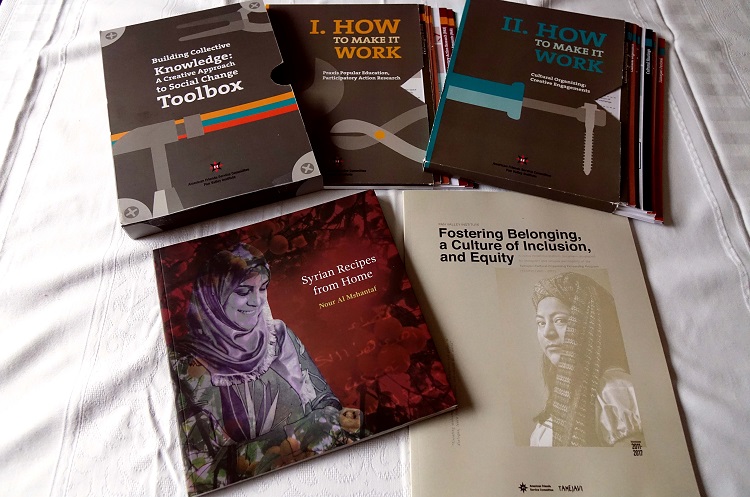
Publications from AFSC's Pan Valley Institute in 2019 AFSC
As we begin 2020, we look back at 2019 with a great sense of accomplishment with the fruition of three Pan Valley Institute publications: a popular education and cultural organizing toolbox, a policy recommendations document, and a cookbook that documents the journey of a Syrian family becoming refugees.
Our hope is that these publications will be more than just informative but will also serve as organizing and advocacy tools. We hope that they will give future popular education practitioners instruments for fostering a sense of agency and belonging among immigrants and refugees.
Developing these publications has been an incredibly long journey! As often happens with non-profits, limited resources and the need to move on to the next immediate action or project left no room for reflection, let alone time to process and systematize our work experiences and lessons learned. As we reached PVI’s 20-year anniversary, we decided to make the intentional effort to create these publications in the hope it will inspire others to take chances at discovering and believing in peoples’ creative approaches for social change.
Many people have contributed to this effort. First and foremost, we want to thank the grassroots leaders, organizers, cultural holders, artists, allies and volunteers who have trusted our work and participated in our programs, resulting in the accumulation of invaluable knowledge and life experiences.
The three publications include:
“Building Collective Knowledge: A Creative Approach Towards Social Change Toolbox”
This title has genuine meaning, as the contents of this toolbox come from documenting dialogues, meetings, stories and creativities shared during our popular education and cultural organizing processes over 20 years. The title is inspired by PVI’s unique experiences working with grassroots communities and serves to recognize and validate the knowledge they have brought to the table.
The toolbox is organized into three main sections.
- “The Theory Behind Our Work” section is comprised of PVI’s history and the principles and values that guide our work. Our values not only encompass popular education, participatory research and cultural organizing, but through exploring other fundamental principles, we also discovered that decolonization, a sense of belonging, women rights, social diversities, race, ethnicity, democracy and active citizenship are central tenants of our practices. This section includes a glossary that contains definitions of concepts that we have developed and used in our practices.
- Section B1, “How to Make It Work: Praxis Popular Education, Participatory Action Research and Cultural Organizing” includes practical tools for starting and sustaining popular education processes, such as the steps for starting a popular education process and participatory action research; communications and documentation; dialogue and engagement; and active citizenship. This section also includes practical tools for participatory techniques and methodologies for conducting community assessments.
- Section B2, “Cultural Organizing: Creative Engagements” focuses on the cultural organizing model that PVI has developed over the past 20 years. This segment includes specific examples of strategies we have used in our cultural organizing practices, definitions of cultural organizing, and how to build and strengthen the capacity of effective cultural organizers.
Fostering Belonging, a Culture of Inclusion and Equity: A policy recommendations document
In this Policy Recommendations Document, we strove to:
- Document the process, methodology and key findings of the community assessment, performed by participants of the Tamejavi Cultural Organizing Fellowship Program (TCOFP) -- most importantly, to validate the data gathered by grassroots immigrant leaders involved in the program.
- Demystify the policy development process by engaging immigrant grassroots leaders in this exercise. Fellows agreed that few policies that impact immigrant communities include their voices, and even less those of rural Central Valley immigrants. Immigrants often play an important role in advocating for policies coming from the top, but they rarely are included in the development of those policies.
- Provide tools for and encourage and support immigrants, refugees, and other community members to advocate for increased opportunities, access, and equitable resources that strengthen their civic and political leadership while enabling them to practice their cultural and creative expressions for bringing social change.
Syrian Recipes from Home, by Nour Al Mshantaf
One of the core objectives of the Pan Valley Institute is to provide outlets to immigrants and refugees to tell their stories with their own voices, with the hope that these stories will shape a more human public narrative that values immigrants’ resilience and cultural diversity. The making of this book has eased the healing process of a refugee family and is building awareness of the consequences of wars. Most importantly, it has inspired a group of Syrian women to come together, organize and support each other while they build community in a country they did not choose, but rather one which they must adopt as home after the war displaced them from their dearest home and families.
We look forward to the challenges and new exciting work for 2020!